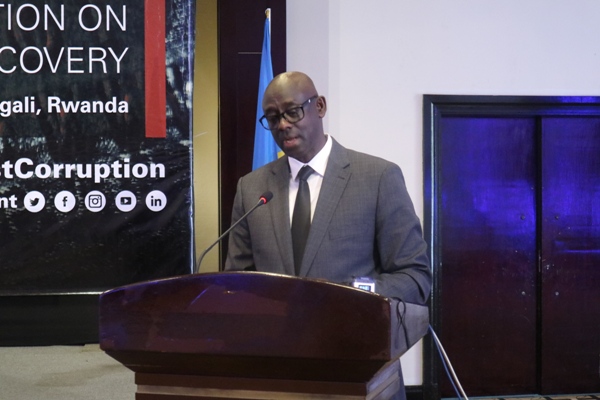
Kigali: At the commemoration of International Anti-Corruption Day at the Bank’s Headquarters in Abidjan, Côte d’Ivoire on December 9, 2015, Hon. Akinwumi Adesina, President of The African Development Bank, revealed that “Africa loses $148 billion to corruption every year. Just think of how many Continents you could light up with that amount”, according Rwandan Minister of Justice, Johnston Busingye, opening today the African Union anticorruption meeting in Kigali. Read below his message:
It is my honour and pleasure to join you today at The 3rd Edition of The African Anti-Corruption Dialogue on the Theme “Towards a Common African Position on Asset Recovery”.
I would like to thank The African Union as well as The African Union Advisory Board on Corruption for convening this important Dialogue in Kigali. You don’t just make us proud hosts when you convene in Kigali, equally importantly you make us better hosts for the next visitor. I also commend The African Union Advisory Board on Corruption for the role they play in preventing and fighting against corruption on the Continent.
This Dialogue will surely engage and reflect on challenges and developments in the asset recovery landscape with the broad objective of using shared experiences and lessons learnt to inform the development of the Common African Position on Asset Recovery.
Dear friends, corruption is real. Hiding of stolen assets is real. Both these are cancers. They have destroyed and continue to destroy countries and lives. They are not African, they are global cancers. But we are talking about Africa today. Africa, dear friends, is replete with examples of the destruction of countries and lives caused by corruption and hiding of stolen assets. Despite the presence of numerous asset recovery frameworks, mainly legal frameworks, institutions set up and tools established, progress on asset recovery especially within Africa remains very unsatisfactory.
A number of African Countries continue to face numerous internal and external obstacles in recovering stolen assets. Internal challenges have been cited as the absence of comprehensive policies, lack of technical capacity and ineffective inter-agency cooperation.
Fortunately, some International and Regional Networks in Asset Recovery have been set up and should be working. I would like to call upon all participants here present to use those networks while trying to recover stolen assets in their respective Countries.
In this respect, Mutual Legal Assistance (MLA) is key to successful asset recovery because it enables us all to transcend individual domestic hurdles and work together.
In addition, African Countries must actively collaborate with External Agencies like Interpol, Money Transfer Agencies, and Central Banks in their respective Countries to ensure asset recovery.
At the commemoration of International Anti-Corruption Day at the Bank’s Headquarters in Abidjan, Côte d’Ivoire on December 9, 2015, Hon. Akinwumi Adesina, President of The African Development Bank, revealed that “Africa loses $148 billion to corruption every year. Just think of how many Continents you could light up with that amount”.
Some reasons for deficiencies in asset recovery are insufficient investigative knowledge, the inherent secrecy of the activities and inadequate resource allocation to financial aspects of the crime, inadequate co-ordination and intelligence exchange of information, inadequate use made of suspicious transaction reports by investigators and customs agencies among others.
Subsequently, following the declaration of 2018 as “The African Anti-Corruption Year”, The African Union Assembly adopted The Nouakchott Declaration on the African Anti-Corruption Year in which AU Member States committed to progressively abolish bank secrecy jurisdictions and tax havens on the Continent, establish public beneficial ownership registers and ensure that public officials declare their assets.
The Assembly also called upon International Partners and Allies to agree on a transparent and efficient timetable for the recovery and return of stolen assets to Africa with due respect for the sovereignty of States and their national interests.
It is in this context that the development of a Common African Position on Asset Recovery has been identified as being an important tool to assist Member States in advancing anti-corruption tangible reforms.
Today, out of the Fifty Five (55) African Countries, only Forty Nine (49) Member States have signed and only Forty One (41) have ratified The African Union Convention on Preventing and Combating Corruption.
Allow me to take this opportunity to call upon all of us to speed up work for the signing and ratification of The Convention.
As I conclude, I would like to encourage all of us to share our respective experiences in fighting corruption and asset recovery. Rwanda is open to share its zero Tolerance to Corruption Policy and its commitment to anti-corruption effective action.
I wish you a productive engagement engagement and, I am happy to declare The 3rd Edition of The African Anti-Corruption Dialogue officially open. (End)
